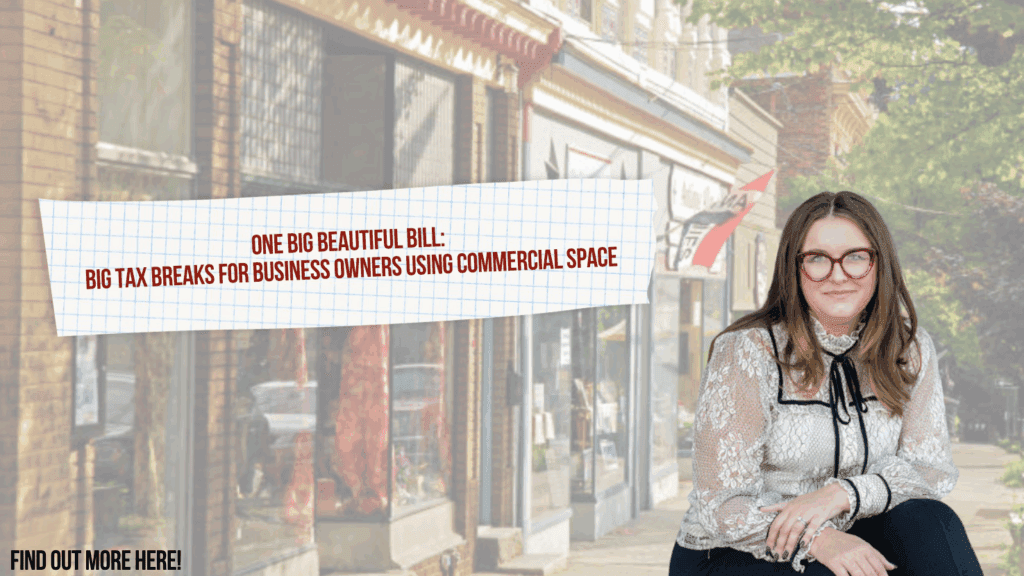What Does the One Big Beautiful Bill Mean for CRE?

The recently passed One Big Beautiful Bill introduces sweeping federal tax changes that could significantly benefit business owners who lease or own commercial property. Whether you are operating from a leased suite, considering a property purchase, or already own the space your business occupies, the bill presents several opportunities to reduce your tax burden and reinvest in your operations.
This legislation is not just for large corporations. It is designed to support small and mid-sized businesses that rely on commercial real estate as a core part of their strategy.
Below is a breakdown of the most impactful provisions and why they matter to commercial real estate users and owners.
1. 100 Percent Bonus Depreciation Extended and Made Permanent
Businesses can now continue to deduct the full cost of qualifying property and improvements in the year those assets are placed in service. This includes building systems, fixtures, furniture, and equipment.
What this means for you: If you are improving your leased space or investing in a property, this provision allows you to take significant deductions up front, improving cash flow and reducing your tax liability in the year of the investment.
2. Section 179 Expensing Limit Increased to 2.5 Million Dollars
The maximum deduction allowed under Section 179 has been raised to 2.5 million dollars, with the phase-out threshold increased to 4 million dollars. These figures will be indexed for inflation beginning in 2026.
What this means for you: Whether you lease or own your space, you can now expense more of your capital purchases immediately rather than depreciating them over several years. This is especially useful for tenant improvements, technology upgrades, or equipment purchases.
3. Qualified Business Income Deduction Made Permanent
The 20 percent deduction for qualified business income (QBI), which was previously set to expire in 2025, has been made permanent.
What this means for you: If your business is structured as an S corporation, LLC, or sole proprietorship, you can continue to deduct up to 20 percent of your net business income from your taxes, providing consistent long-term tax savings.
4. Expanded Interest Deductibility Based on EBITDA
The calculation for the business interest expense limitation has been revised. Interest limitations will now be based on earnings before interest, taxes, depreciation, and amortization (EBITDA), rather than EBIT.
What this means for you: Businesses that have financed the purchase of commercial property or have invested in large-scale improvements may now deduct a greater portion of their interest expenses.
5. Research and Development Expenses Fully Deductible Again
Domestic research and development expenses are now fully deductible in the year incurred. This change is retroactive to 2022 for businesses under a specific revenue threshold.
What this means for you: If your business has implemented smart systems, automation, energy-efficient technology, or other innovative solutions in your space, these expenses may qualify for immediate deductions.
6. Cost Segregation Paired with Bonus Depreciation
Owners of commercial property can use cost segregation studies to identify short-life assets within a building, such as lighting, flooring, and cabinetry. These components can then be depreciated more quickly, and when paired with bonus depreciation, the tax benefits are substantial.
What this means for you: If you recently purchased or plan to purchase a building, you may be able to write off a significant portion of the purchase price in the first year, improving your return on investment.
7. Opportunity Zones and Low-Income Housing Tax Credits Now Permanent
The bill makes both programs permanent and streamlines compliance, creating long-term incentive structures for investing in underdeveloped or underserved areas.
What this means for you: If you are developing a new location, relocating, or investing in an impact-driven area, these programs may reduce your tax liability while supporting broader economic development.
8. Higher Reporting Thresholds for Form 1099
The reporting threshold for Forms 1099-NEC and 1099-MISC will increase from 600 dollars to 2,000 dollars starting in 2026. The 1099-K threshold will also revert to 20,000 dollars and 200 transactions.
What this means for you: Although income is still reportable, you may see a reduced administrative burden related to vendor and contractor reporting requirements.
What Business Owners Should Do Next
If you lease, own, or are considering owning commercial space, here are a few next steps:
- Schedule time with your CPA to update your tax strategy for 2025 and beyond
- Reassess whether leasing or owning your space is most advantageous under the new tax laws
- Consider capital investments now to take advantage of full expensing options
- Look into cost segregation opportunities if you own or plan to acquire property
- Document and evaluate all technology or facility upgrades that may qualify as research and development expenses
- Review your financing structure to optimize interest deductions
Final Thoughts
The One Big Beautiful Bill has created significant tax-saving opportunities for business owners who use commercial space as a critical part of their operations. These changes reward proactive planning and strategic investment in real estate, equipment, and innovation.
At Beyond Commercial, we help clients navigate the space decisions that directly affect the success of their business. If you would like to review your lease, explore a potential purchase, or structure a smarter real estate plan for 2025, we are ready to help.
Feel free to reach out with questions or to schedule a consultation.
Watch the video on Youtube Here: https://youtu.be/kHh8nu24dcw
